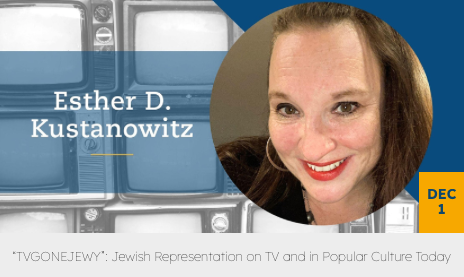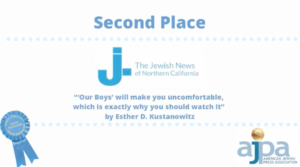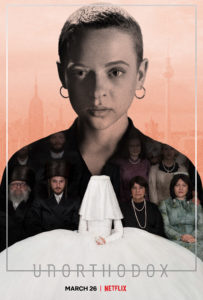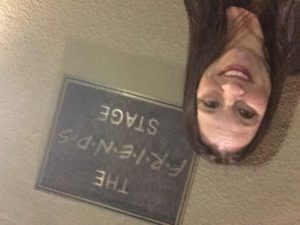
December 1, TVGoneJewy @ American Jewish University
0
Click link to register.
Join me for a special Hannukah/Hanukkah/Chanukah/?? edition of my session delving into Jewish identity on the small screen. We’ll see how many examples we can get through in 60 minutes!
Wednesday, 12/1/2021 @ 12pm-1pm PST – register in advance and the Zoom invitation will be emailed to you 7 days prior.
More about TVGoneJewy: From unscripted bingeworthy shows to nuanced dramas, Jewish writers and content creators are reclaiming and reshaping Jewish identity on-screen, and audiences are reacting to the increased Jewish representation with enthusiasm and worry, alternating between celebration and condemnation. What do we expect from on-screen Jewish representations of secular and religious Jews and their identities? Why is this happening now? How are creators hitting or missing the mark?

My Podcast, The Bagel Report, is an Awards Finalist
0
UPDATE OCTOBER 2021: We placed SECOND! Behind KCRW and ahead of NPR…amazing. 🙂
Thrilled that our The Bagel Report interview featuring Mayim Bialik is a finalist in the Podcast Personality Profile/Interview category at the upcoming SoCal Journalism Awards, sponsored by the L.A. Press Club!
Congrats to all the nominees. Awards will be distributed in October, but it’s just an honor for our little podcast to be a finalist. 🙂
Check out our most recent episode and the nominated episode below!

The One With the Lessons We Learned: A Jewish Look Back on ‘Friends’
0Over Memorial Day Weekend, fans of the TV show Friends received a long-awaited reunion of the six main cast members, who played Ross, Rachel, Monica, Chandler, Phoebe and Joey for 10 seasons over 11 years on NBC. The show broke ratings and popularity records during its time on the air, and was resurrected to entertain a new generation, first on Netflix and then as one of the Warner properties to anchor HBO Max. Reviews of the reunion, which is now streaming on HBO Max, have been understandably mixed; how could a reunion satisfy millions of rabid fans around the world 17 years after the series concluded? But many tuned in for the nostalgia factor, an opportunity to say “Remember when…??” along with the actors who gave the memorable scenes their life and longevity.
Friends wasn’t identified as problematic when it aired, the decade from 1994-2004, an era before any of us had heard the term “wokeness.” But we knew that the world of Friends was pretty monochromatic and non-diverse, with more than a few storylines and jokes that crossed into homophobia or fat-shaming. And the Jewish moments–especially a Holiday Armadillo taking Santa’s place in the life of a two-faith family–were few, farfetched and fraught.
But Friends captured a moment for a generation–those of us who transitioned from college to real life around the same time as these Friends of ours. Although Chandler the character was fictional, he worked in the Manhattan high-rise three buildings down from where I non-fictionally worked at Hadassah. On one Hadassah lunch hour, I saw the non-fictional actor Matthew Perry in Central Park, followed him around a bit, introduced myself (why?) and hyperventilated back at the office.
When new episodes premiered, a group of us got together to watch; when we were able to consume the show in reruns, the tribe expanded, then again when we had access to YouTube clips, GIFs and Etsy stores of unlicensed merch. But beyond the relationships, the catchphrases, the actors and writers, were the life lessons that could be gleaned from the sitcom, if you looked for deeper meaning within.
- Insider language makes some people feel included, except for everyone who feels excluded. Some of us watched so often that it altered our pronunciation of certain words and phrases: “we were on a break,” or “how you doin’?” or even a single word like “lobster” or “London!” Some of us may feel the need to correct people claiming their name is “Josh” to “JoshuAH,” a hazard in Jewish professional circles because of the extremely high Josh density. But it’s a reminder to know your audience and define unfamiliar terms–whether it’s what it means to “pull a Monica” or explaining the story of Hanukkah–to ensure accessibility to those who have different experiences than your own.
- It’s important to read the whole thing before you express your agreement. Rachel gave Ross a letter to read–”18 pages, front and back”–to see if he was sorry for how he behaved when they were ON A BREAK; he famously fell asleep before finishing it, which led to trouble later on. First of all, 18 pages? I see you, Jewish number. Secondly, imagine if people really behaved this way, circulating articles they hadn’t read, or hadn’t read through! What a world THAT would be.
- Even if you’re an expert in something, you can always learn something. A Danish-Israeli friend insisted one Friends episode had mentioned that Ross and Chandler had stayed in Kiryat Moriah, a neighborhood in Jerusalem, while visiting Israel. I knew Friends! She had to be wrong. But she wasn’t. (The clip is available on YouTube.) And it left me wondering about Ross and Chandler’s Israel trip: why they went and on what program, where else they visited, if they went to the Dead Sea or Yad Vashem, or partied awkwardly in Tel Aviv. You know, the usual questions.
- If something scares you, put it in the freezer. While the Friends freezer already contains copies of The Shining and Little Women, I believe there’s room in there for the Israeli-Palestinian conflict; I think I can squeeze it in there, between anti-Semitism and post-COVID dating…
- Babies do sometimes have the strangest taste in music. Rachel and Ross discovered that the only song that could get baby Emma to stop crying was “Baby Got Back.” As a baby, my brother used to hum songs from the Chassidic Song Festival. I used to sing “Sweet Child O’ Mine” to my friend’s baby. Spotify, which reports to me on my friends’ listening habits, identified a friend as a repeat listener to the theme from Schindler’s List; she later explained it was the only thing that lulled her infant to sleep. Kids are fascinating.
- The honest truth is so rare that when we see it, we want more. Phoebe’s “inappropriate” children’s songs–covering topics like grandparent mortality, bisexuality and where meat comes from–peeled back the curtain to reveal the truth that the kids always suspected was there, but hidden by their fearful or well-meaning parents. What truths would we want Phoebe to share with us, as a Jewish community or as a society, with her songs for 2021?
There are many other miscellaneous lessons: Ross’s leather pants taught us that lotion + powder = paste. Monica taught us that aunts should always have gum. Rachel taught us that if your cookbook pages are stuck together, your classic trifle will have layers of ladyfingers, jam and beef sauteed with peas and onions. Chandler reminded us that in every group of friends, there’s at least one whose job is a mystery; he may be handling the WENUS, but that doesn’t make him a transponster because that’s not even a word. Phoebe is unapologetically odd, quirky and unique, and Joey–like Rabbi Hillel does in the Passover seder–reminds us of the value of sandwiches.
If you’ve read this far, you’re probably one of us, a person who has shared the memorable moments with their own friends and created community around a TV show or another cultural text as source material. So you understand: when you’re in close community with people who know you well, even small or nonsensical moments –whether it’s throwing a ball around for hours; watching TV with your bestie, a chick and a duck; or talking Jewish community issues and politics–can be an enthrallingly good time. And it’s because you’re protected by the covenant of your friendship: they’ll be there for you, and you’re there for them too.

New Year, New TVGoneJewy Sessions
0 TVGoneJewy, a program exploring the increase of Jewish content on television, started as an in-person program at various Jewish conferences. When the pandemic hit, the class transitioned to Zoom and entertained hundreds of people virtually at nearly a dozen programs during 2020.
TVGoneJewy, a program exploring the increase of Jewish content on television, started as an in-person program at various Jewish conferences. When the pandemic hit, the class transitioned to Zoom and entertained hundreds of people virtually at nearly a dozen programs during 2020.
TVGoneJewy is coming to even more Zoom screens in 2021 – see below for finalized dates, times and registration links when available. (All times are Pacific – let me know if you can’t do the math. :))
Want to follow some TVGoneJewy posts? Or want to connect about hosting a TVGoneJewy program for your community? Connect, check out posts and converse at Twitter.com/TVGoneJewy and Facebook.com/TVGoneJewy.
2021
Thursday, January 14, 4:30pm – Congregation Shaarey Zedek in East Lansing, MI (adults)
Sunday, January 17 – Congregation Shaarey Zedek in East Lansing, MI (invite only – teens)
Saturday evening, January 23 – Temple Emanuel of Beverly Hills (invite only – Havdalah and program)
Wednesday, March 17, 4pm – University of Connecticut, Jewish Studies Department (public program)
2020
Temple Chizuk Amuno, Baltimore, MD – December 2020
Community Scholars Program of Orange County, CA – December 2020
Special Program for Jewish clergy: Heshbon Heshvan – October 2020
Hebrew Helpers, Los Angeles, CA – September 2020
Congregation Rinat Yisrael, Teaneck, NJ – August 2020
Hollis Hills-Bayside Jewish Center, NY – August 2020
Genesis Program @ Brandeis University – July 2020
Limmud eFestival – May 2020
LimmudNY Fest – February 2020
Limmud Seattle – January 2020
Making Meaning in Their Memory
0I was honored and delighted to run this workshop on creative loss rituals for Haggadot.com and their new HighHolidaysatHome.com microsite:
Judaism has a treasury of customs and rituals that keep us connected to the loved ones we’ve lost. With the High Holidays as a launchpad, this interactive workshop invited participants to share lessons from loved ones and included opportunities to reflect and create in their memory.

Rockower Awards for Jewish Journalism – 2nd Place, Arts
0 Thrilled to be among the winners for this year’s American Jewish Press Association Rockower Awards, placing second in the arts and criticism, news and features category for this piece I wrote about Our Boys.
Thrilled to be among the winners for this year’s American Jewish Press Association Rockower Awards, placing second in the arts and criticism, news and features category for this piece I wrote about Our Boys.
J. wins record-breaking 12 national Jewish press awards, including General Excellence
‘Our Boys’ will make you uncomfortable, which is exactly why you should watch it
After You’ve Watched Hamilton: Pop Culture to Consume This Weekend
0
Schindler’s List is also now available on Netflix.
Airplane (Netflix) – The “Air Israel, please clear the runway” scene is a broad, blink-and-you-miss-it moment, but one of the first times I’ve ever remembered seeing “Israel” even get a mention in a big film, much less in a comedic context.
Fiddler on the Roof (Netflix) – Hurry up and watch the original before they remake it. Why? Because it’s TRADITION.
Spaceballs (Netflix) – If you’re a Druish American Princess who’s been looking for a new password for her Royal Highness’s matched luggage, why not try the combination an idiot would have on his luggage?

Get Angry, Then Get Inspired to Work for Justice
Whether your justice work centers on journalism/identifying clergy abuse (Spotlight), ensuring that there’s appropriate diversity in trans representation on screen (Disclosure) or fighting against entrenched, systemic racism, especially in the the criminal justice system (13th), Netflix has the docs to get you educated and fired up about equality.
Netflix also has a nausea inducing four-part series about Jeffrey Epstein, but with that story back in the news this week as Ghislaine Maxwell was arrested, maybe it’s worth looking at how incredibly horrifying the “Ponzi sex scheme” of teenagers truly was, and how he got away with it for so long. Or maybe it’s not, I’m kind of nauseated just talking about it. While it’s possible Epstein’s suicide provided some victims with some relief that their predator was literally removed from the earth, others know that he never got the legal justice he deserved. Perhaps we just need to look at the Epstein story as cautionary tale: just as we know the criminal justice system doesn’t work for the most impoverished, trapping them in a cycle of reincarceration, disproportional sentencing and desperate criminality, we also know that wealth and prominence may be able to dismiss charges and allow perpetrators to roam free to perpetrate again with no consequences. The system needs equalizing. We can’t solve it all this weekend, but getting educated–and getting angry about inequity–is a good start.
Pay Tribute to Carl Reiner
- The Man With Two Brains & Dead Men Don’t Wear Plaid (written by Reiner), The Jerk, All of Me and Oh God! (directed by Reiner) – all available for rental (All of Me may be available on HBO)
- Oceans 11, 12 & 13 – available for rental
- Blazing Saddles
- CBS is airing two episodes of the Dick Van Dyke show in Reiner’s memory.
Watch The Film That Predicted [Waves Hands Around Wildly] THIS
Idiocracy, the Mike Judge film about the stupidification of America and the downfall of our society, arrives July 4 (free on Hulu, or as a rental). Cautionary tale? A prediction of our now-foreseeable future? You be the (Mike) Judge.
Our World Now (plus reading list in process)
02020 was supposed to be a year of clear vision, of plans plotted and goals achieved. There was optimism. There was renewed creative energy and political movement. And then…
Since the arrival and prolonged sojourning of COVID-19 in America, we’ve been through a series of challenges: contagion and containment; restricted movement; business closures; adaptation to home working environments and for many balancing other household members; pivoting work plans, coping with furloughs and firings and frozen futures; and working to get that curve flattened by wearing masks, ordering delivery and wiping down surfaces, and keeping our distance from friends and even loved ones. That was bad. It was frustrating and depressing and isolating. And then…
Here we are. Isolated. Depressed. Frustrated. Angry. In deep pain. Fractured and fragmented, as individuals and society. Uncertain. Untrusting. Off-kilter. Frightened. Feeling the pull between staying safe and taking action. And now?
I have come to realize how little I know about how deeply enmeshed racism is in America. And I want to learn more so that I can do more.
I’ve asked trusted friends to recommend resources–online content, books, people to follow on social media–and will share them and relevant/interesting quotes here on an ongoing basis as I read/watch/listen/consume them, even if they raise some complicated issues. (And many of these sources may have a Jewish element to them, as that’s the community from which I hail.) My hope is to keep myself centered on this issue in the days ahead, and track things that have been helpful to me and may be helpful for others.
June 2, 2020
READ: “Believe Us”: Black Jews Respond to the George Floyd Protests, in Their Own Words (JTA.org)
- White Jews who are reaching out to black Jews asking what can be done is “a step forward and it’s good, but it’s asking more of us as Jews of color to not only figure out how to maintain our jobs and do additional leadership and activism in this moment, but then also being asked to support and manage white Jews’ work during a time in which many of us are traumatized and heartbroken.”
- “We need more from our white Jewish siblings, and more from our Jewish institutions — we need support, allyship, resources, and strategies to confront racism in our community, and in our world.”
SUBSCRIBED: The Tribe Herald, Multicultural Media
June 3, 2020
FOLLOWED: 13 Jews of Color to follow on Twitter (via Kveller)
June 4, 2020
WATCHED: John Boyega George Floyd protest London speech in full: Star Wars actor’s powerful Hyde Park message
READ: KC Ifeanyi commentary on what’s missing from the speech: an emphasis on protecting black women and black transmen (Fast Company)
- “Uplifting and supporting black women, especially within our own community, is paramount. And Boyega was wise to give such a reminder in front of a rapt and mostly black audience. However, I’d like to put a finer point on what Boyega said: Black women, cis and trans, need to be protected and honored in the community—and also within the scope of the larger movement.”
- “It’s a hard-to-ignore fact: The death of cis black men tends to garner more media coverage and attention on social media than the deaths of cis, and especially trans, black women and men. To some, it may seem like a grimmest splitting of hairs, but the erasure of black women and black trans-men within the larger push for black equality has to be checked.”
READ & STILL PUZZLING OVER: Anti-racist Reading Lists: Who are they for? (Vulture)
- “I suppose the anti-racism reading list is exactly for that person, the person who asks for it. And yet the person who has to ask can hardly be trusted in a self-directed course of study, not if their yearning for gentle education also happens to coincide with their earliest exposure to books written by people who are not white. Anti-racism reading lists fail such a person, for they are already predisposed to read black art zoologically. Whether the stories are fact or fiction is irrelevant — no one either knows or cares why certain writers express themselves in certain forms at certain times.”
READ & STILL THINKING ABOUT: Stories from the Tribe Herald
June 5, 2020
WATCHED: Rabbi Isaiah Rothstein’s takeover of Mayim Bialik’s social channels, an amplification of his conversation about being an “undercover brother,” a mixed-race person, and how we can help to fight for racial equity.
More resources–and posts related to and unrelated to racism in America–to come.

March 29: TVGoneJewy at Limmud North America eFestival (digital)
0 Honored to be presenting “TVGoneJewy: TV’s Jewish Renaissance” in this first ever Limmud North America eFestival, featuring 50 educators, thought-leaders and change-makers teaching about today’s most interesting Jewish ideas!
Honored to be presenting “TVGoneJewy: TV’s Jewish Renaissance” in this first ever Limmud North America eFestival, featuring 50 educators, thought-leaders and change-makers teaching about today’s most interesting Jewish ideas!
For more information or to register: https://www.limmudna.org/efestival

Netflix-and-Kvell-and-Purell: Jewish-Themed & Israeli TV to Watch While Quarantined
0 If you’re quarantined, self-quarantined or just playing it safe and socially distant, you’re probably logging a lot of hours on devices consuming entertainment.
If you’re quarantined, self-quarantined or just playing it safe and socially distant, you’re probably logging a lot of hours on devices consuming entertainment.
Good news is that there’s lots of content to choose from: here’s my first list (of undoubtedly several) to keep you entertained while you’re staying safe and the world figures out what’s next.
Comedy? Drama? A combination? Brand new shows and classic films?
Check them all out here at the J..
